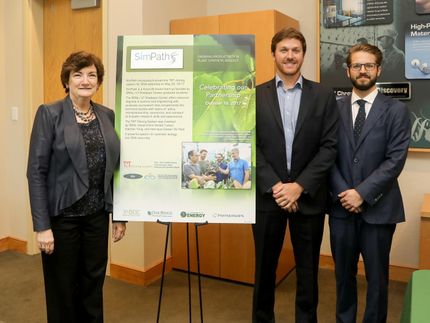Faster genome evolution methods to transform yeast for industrial biotechnology
Scientists have created a new way of speeding up the genome evolution of baker's yeast Saccharomyces cerevisiae, the same yeast people use for bread and beer production, to develop a synthetic yeast strain that can be transformed on demand for use in various industrial applications.

In vitro and in vivo SCRaMbLE-in methods.
DAI Junbiao
A research team led by Prof. DAI Junbiao at the Shenzhen Institutes of Advanced Technology (SIAT) of the Chinese Academy of Sciences, in collaboration with Prof. Patrick Cai from the Manchester Institute of Biotechnology, developed a "rapid, efficient and universal" way of transforming yeast at the molecular level using a method called SCRaMbLE (Synthetic Chromosome Rearrangement and Modification by LoxP-mediated Evolution).
This system allows researchers to "reshuffle the deck of cards" for the genome, and customize new yeast strains that can recombine on demand with each other to generate novel genome combinations not found in nature before.
Yeast is a very well understood organism and in a biological sense humans and yeast share a number of similarities in their genetic makeup. Therefore, re-building the yeast genome from the ground up helps us better understand the basis of human life.
"Essentially, we can fast-track the engineering cycle. Usually it would take years to optimize yeast strains for industrial applications, but with SCRaMbLE it could take just two or three days. When you can couple engineering with evolution, you have a very powerful tool in hand," said Prof. Cai.
The SCRaMBLE system not only allows researchers to integrate pathways into the synthetic yeast genome, but the yeast itself can also be evolved to become a better host under stress conditions, providing a unique opportunity for it to evolve, adapt to challenges and perform in extreme conditions, such as extreme temperatures and toxic environments.
This makes it particularly attractive for industrial biotechnology applications, such as the production of advanced medicines. This could have massive implications for the future study of DNA and the mass production of new medicines to treat illnesses such as malaria and tuberculosis (TB).
"One of the most exciting developments in industrial biotechnology is the synergy between synthetic biology and metabolic engineering that is enabling us to produce fuels, novel medicines and high value chemicals, nutrition supplements, anti-tumor molecules and antibiotics," said Prof. Cai. "I hope that the technology we have developed here will go some way to speeding up the process for the bio-manufacture of these important products."
Original publication
Zhouqing Luo, Lihui Wang, Yun Wang, Weimin Zhang, Yakun Guo, Yue Shen, Linghuo Jiang, Qingyu Wu, Chong Zhang, Yizhi Cai & Junbiao Dai; "Identifying and characterizing SCRaMbLEd synthetic yeast using ReSCuES"; Nature Comm.; 2018
Original publication
Zhouqing Luo, Lihui Wang, Yun Wang, Weimin Zhang, Yakun Guo, Yue Shen, Linghuo Jiang, Qingyu Wu, Chong Zhang, Yizhi Cai & Junbiao Dai; "Identifying and characterizing SCRaMbLEd synthetic yeast using ReSCuES"; Nature Comm.; 2018
Topics
Organizations
Other news from the department science

Get the life science industry in your inbox
By submitting this form you agree that LUMITOS AG will send you the newsletter(s) selected above by email. Your data will not be passed on to third parties. Your data will be stored and processed in accordance with our data protection regulations. LUMITOS may contact you by email for the purpose of advertising or market and opinion surveys. You can revoke your consent at any time without giving reasons to LUMITOS AG, Ernst-Augustin-Str. 2, 12489 Berlin, Germany or by e-mail at revoke@lumitos.com with effect for the future. In addition, each email contains a link to unsubscribe from the corresponding newsletter.



















































